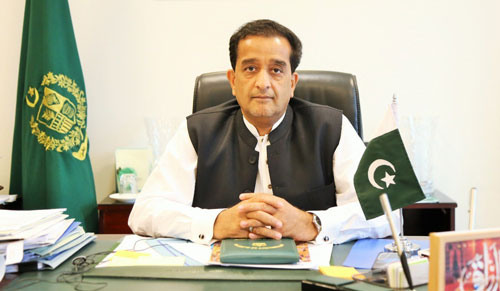With only 1pc contribution to GHG, Pakistan’s economy, biodiversity severely affected by climate changes: Amin Aslam
Zubair Qureshi
World recognizes Pakistan’s achievements in environment and therefore the country was selected to host this year’s World Environment Day (WED) together with the United Nations Environment Programme.
The participants of a webinar expressed these views while recognizing the country’s global leadership in advancing ecosystem conservation and protection.
The Aga Khan Agency for Habitat, the Ministry of Climate Change, Pakistan, World Habitat Awards and the United Nations Habitat Programme, co-organized an international virtual seminar on Ecosystem Restoration for Quality of Life.
The seminar was attended by representatives from the Ministry of Climate Change, the United Nations, INGOs, Aga Khan Development Network (AKDN) agencies and partners, donor agencies, academia, media and community organizations.
In his message, Special Assistant to the Prime Minster on Climate Change, Malik Amin Aslam, shared that “Although our contribution to global Green House Gases (GHG) emissions is less than 1pc, Pakistan’s people, biodiversity and economy are severely impacted by climate change, with more frequent disasters.
We are working to counteract these trends through ambitious initiatives such as the honorable Prime Minister’s Clean Green Pakistan Programme and the Ten Billion Tree Tsunami Programme to restore the ecosystem and electric vehicle policy.
During the seminar, speakers from UN-Habitat, Aga Khan University, Aga Khan Rural Support Programme, and Aga Khan Agency for Habitat shared their experiences in ecosystem restoration and improving quality of life for communities living in mountainous areas to coastal belts and urban centres of Pakistan and globally.
In his opening remarks, Rafael Tuts, Director Programme Division, UN-Habitat, said that “We have been exploiting and destroying our planet’s ecosystems, and the pandemic has also shown how disastrous the consequences of ecosystem loss can be.
David Ireland, Chief Executive of World Habitat, said: “What makes AKAH’s work exceptional is that it’s not just responding to the effects of the climate emergency but is being proactive in protecting people from its effects – through using technology and the knowledge of the communities themselves.
Hafiz Sherali, President, Aga Khan Council for Pakistan, explained that “In many of the areas where AKDN works, climate change compounds the risk of natural disasters resulting in the loss of lives and livelihoods.










